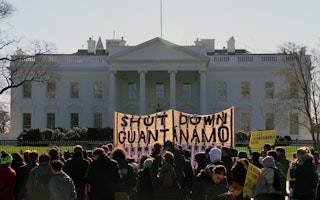No State Accountability for North Carolina Contractor Who Helped CIA Torture
By Catherine Read

On December 9, 2014, the Senate Intelligence Committee released a 500-page executive summary of its 6,000-page report on the history of the CIA’s detention and interrogation program. The report exposed just how brutal and ineffective the torture was, and the lengths to which the CIA went to hide that truth from the public.
Four years have passed since the report was released—yet only three copies of the full report exist outside Senate Intelligence Committee’s vault, and what is available for public scrutiny is less than 10 percent of the report. The Committee voted only to release a heavily redacted executive summary and, since then, the CIA and its allies in Congress have sought to limit who has access to the report and who can read it in its entirety. The U.S. public, in other words, is still in the dark when it comes to this crucial chapter of its own recent history.
To be sure, the ACLU has been doing heroic work filing Freedom of Information Act requests. And citizen-led groups—like my own organization, the North Carolina Commission of Inquiry on Torture—work hard to use what’s available in the public record to piece together details on the CIA’s rendition, detention, and interrogation program and inform the public. Nonetheless, the vast majority of what the Senate Intelligence Committee discovered in their investigation remains shielded from public inquiry.
Recently, the Commission—which was established to provide an opportunity for public discussion and engagement on the torture program, to foster respect for the rule of law, and to help build momentum for redress—presented its report, Torture Flights: North Carolina’s Role in the CIA Rendition and Torture Program [PDF].
The Commission’s investigation and report draws on the Senate Intelligence Committee’s report, but our report primarily focuses on the CIA’s rendition program which has not been the subject of any government accounting. Ours is also the first report to examine the role that a state played in the rendition, detention, and interrogation program and outlines its legal obligations—under both international and federal law—as well as how they can play a role in pursuing transparency and prevent the use of torture.
One of Torture Flights’ most significant findings is the uncovering of the role that North Carolina played in the CIA’s program. Understanding their role implicates new individuals in the program as well as opening up additional avenues to pursue accountability.
The report finds that during the developmental phase of the CIA’s global “black site” system, from September 2001 to March 2004, the North Carolina CIA-affiliated company Aero Contractors flew more than 80 percent of all identified CIA renditions. Aero was integral to the CIA program.
To launch its interrogation program, the CIA contracted with and ultimately paid $81 million to two psychologists who had no experience as interrogators or with counterterrorism. Their objective was to terrorize suspects through techniques like sleep deprivation into feeling they were helpless and would thus divulge what they knew.
Likewise, we also found that the goal of the CIA’s rendition program was to dehumanize individuals before they could be interrogated. The violence of renditions themselves, which the U.S. government has never investigated, amounted to torture or cruel, inhumane, and degrading treatment.
The report also lays out in detail a clear—and bipartisan—record of North Carolina’s public officials lacking moral courage. State and county officials have neglected their duty to investigate credible information on crimes committed using taxpayer-funded airports.
In 2005, for example, a group of North Carolinians began protesting against Aero—but despite years of public outrage, successive governors and attorneys general have remained silent. Officials in Johnston County have spoken up, it’s true—but only to praise Aero and deny that anything it did was illegal. Public records requests reveal that instead of investigating Aero Contractors, North Carolina’s officials sought to quiet their own constituents.
The Commission was founded on the belief that if government fails in its responsibilities, then citizens must act. It has investigated what occurred, who was harmed, why it wasn’t stopped, and why no one was punished, so that the public may better understand what was done in our name.
We hope that the report will help galvanize calls for greater transparency and full accountability for the CIA’s torture program, including that the full Senate Intelligence Committee report be declassified. Only when we pursue openness and accountability will we ensure that we don’t repeat this dark chapter of our history.
The North Carolina Commission of Inquiry on Torture is a grantee of the Open Society Foundations.
Catherine Read is the executive director of the North Carolina Commission of Inquiry on Torture.


